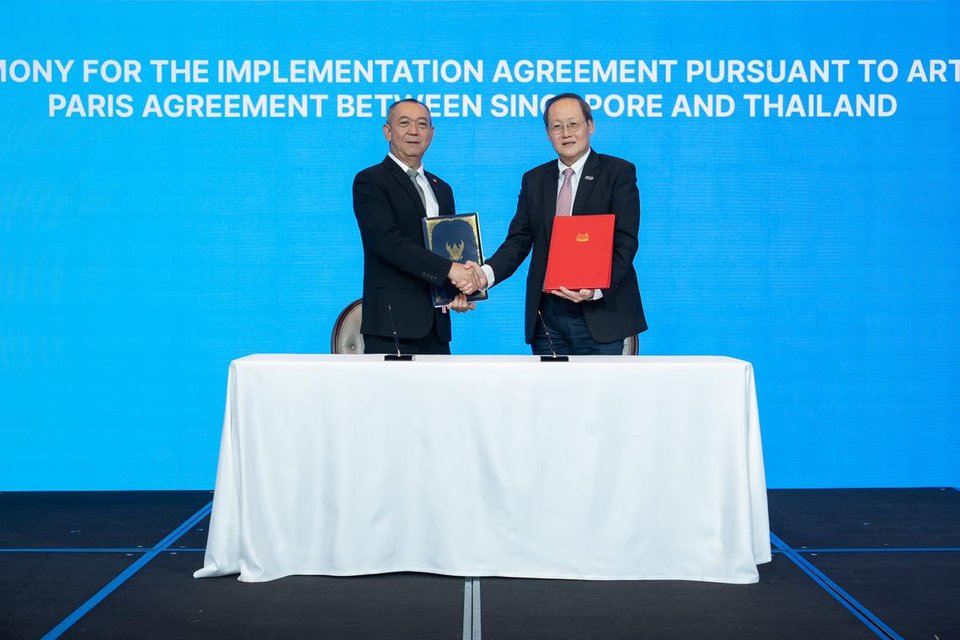Singapore and Thailand Seal Landmark Carbon Credit Deal: What It Means for ASEAN
News

The ASEAN carbon market has officially taken a big step forward. On August 19, 2025, Singapore signed its first Implementation Agreement (IA) in Southeast Asia with Thailand under Article 6.2 of the Paris Agreement.
This move marks not only Singapore’s first bilateral carbon credit partnership in the region but also an important milestone for ASEAN as it looks to strengthen climate cooperation and unlock the potential of carbon markets.
What Is Article 6.2 and Why Is It Important?
Under the Paris Agreement, Article 6 provides mechanisms that allow countries to cooperate in meeting their climate targets. Specifically, Article 6.2 enables countries to transfer carbon credits formally known as Internationally Transferred Mitigation Outcomes (ITMOs) between one another.
This flexibility is critical. Not all countries have the same capacity to reduce emissions domestically. Article 6.2 allows nations with lower-cost or high-impact carbon reduction opportunities (such as reforestation, mangrove restoration, or renewable energy projects) to generate credits that can be transferred to countries seeking to meet their Nationally Determined Contributions (NDCs).
In short: Article 6.2 helps countries collaborate, accelerate climate action, and reduce overall global costs of achieving net zero.
Why Singapore and Thailand?
Singapore has been positioning itself as a regional hub for carbon services and trading, investing in infrastructure, regulations, and partnerships to establish a robust marketplace. By entering this agreement, Singapore demonstrates its commitment to sourcing high-quality credits from within ASEAN, not just from outside the region.
Thailand, on the other hand, has been advancing its Bio-Circular-Green (BCG) Economy Model and has set ambitious emissions reduction targets. Partnering with Singapore gives Thailand access to more financing opportunities for local carbon projects, while also strengthening its role in the emerging regional market.
Key Takeaways from the Singapore - Thailand Agreement
-
First ASEAN IA under Article 6.2
This is the first time Singapore has signed an Implementation Agreement in Southeast Asia. It establishes a framework for credit transfers between the two nations. -
Boost for Regional Collaboration
The agreement paves the way for other ASEAN countries such as Vietnam, Indonesia, Malaysia, and Cambodia to consider similar partnerships. A more connected regional carbon market could increase liquidity and credibility. -
Support for Net Zero Pathways
By enabling cross-border carbon credit trading, the deal provides both countries with additional tools to meet their climate commitments while channeling funds into real climate projects.
What This Means for ASEAN
This agreement signals the start of a more structured carbon market in ASEAN. While individual countries like Indonesia and Malaysia have been exploring domestic carbon pricing and project development, regional collaboration has been slower to take shape.
The Singapore - Thailand deal could serve as a blueprint for others. It shows that ASEAN nations can align under Article 6.2, share benefits, and create a pipeline of high-quality, verifiable carbon credits that not only serve compliance needs but also attract international investment.
For businesses, this development means new opportunities. Companies across the region can participate in or benefit from carbon projects that generate co-benefits such as:
-
Restoring degraded ecosystems
-
Supporting local communities with new income streams
-
Enhancing biodiversity conservation
-
Driving investment into sustainable land use and renewable energy
What’s Next for the Region?
ASEAN is one of the most climate-vulnerable regions in the world, with millions of people dependent on agriculture, forestry, and coastal ecosystems. A regional carbon market could channel billions of dollars into protecting these assets while supporting inclusive growth.
Looking ahead, we can expect:
-
More bilateral agreements under Article 6.2 between ASEAN countries.
-
Growing demand for high-quality nature-based credits, especially from forestry and mangrove projects.
-
Increased collaboration between governments, project developers, and the private sector to ensure transparency and credibility.
Conclusion
The Singapore - Thailand Implementation Agreement is a milestone moment for Southeast Asia. It signals that ASEAN countries are ready to move from discussion to action, building frameworks that enable collaboration and unlock climate finance at scale.
For investors, asset owners, and communities, this agreement is a glimpse of what a regional carbon market could deliver: stronger climate action, cross-border partnerships, and sustainable development opportunities.
👉 Want to stay updated on the ASEAN carbon market? Visit our Fairatmos blog for the latest insights.

